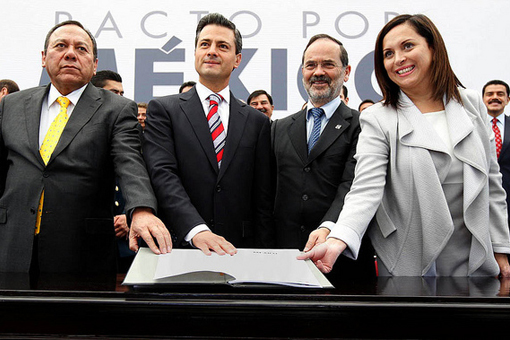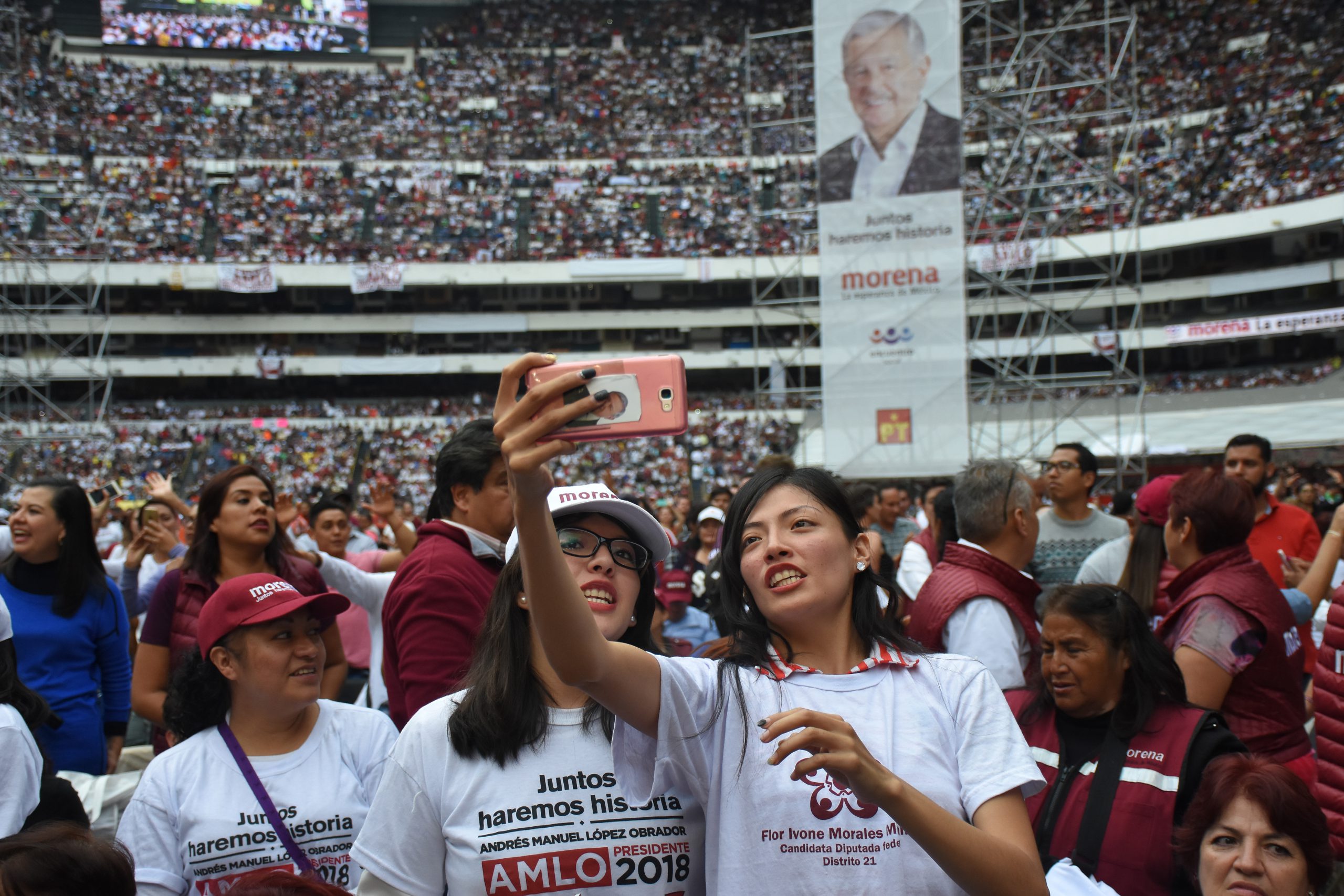MEXICO CITY —Mexico’s July 7 local elections, held in half of the country’s states, were the first since President Enrique Peña Nieto took office. As such, they served as a quasi-referendum on the president’s Partido Revolucionario Institucional (Institutional Revolutionary Party—PRI), and provide the political backdrop against which Peña Nieto will push his agenda to remake Mexico into a global powerhouse with a vibrant, reformed democracy.
On the surface, the election results represented a mild defeat for Peña Nieto. Out of 13 state capital mayoralties in play, the PRI won nine and the Partido Acción Nacional (National Action Party—PAN) won four. The PRI retained important cities like Tijuana and Ciudad Juárez—the largest ones on the border with the United States—and won others from the opposition in the states of Sinaloa, Quintana Roo and Oaxaca.
However, the PAN retained the city of Puebla and pulled in significant victories in the states of Coahuila and Tamaulipas, both PRI strongholds, and in the states of Aguascalientes, Sinaloa and Veracruz. In Baja California, the only state to hold a gubernatorial election, the outcome was very close and awaits certification through a recount—but the PAN’s candidate, Francisco Vega, who ran against PRI candidate Fernando Castro Trenti, is confident the party will prevail for the fifth consecutive time. In the end, the PRI will govern approximately 5 million fewer people than it does now.
Yet the mild electoral snub for the PRI could prove to be Peña Nieto’s gain. Had the results tilted a little too much in PRI’s favor, it would have risked alienating the opposition and cost the president vital allies in his quest to reform energy and government finances. As it stands, the vote preserved the delicate political balance he needs to press forward with reforms.
It seems counterintuitive that state losses can help the president at the national level, but given the degree to which governors influence the local electoral systems, when a governor’s party loses, the loss can actually boost the ousted party’s credibility by showing that the party is willing to play by the rules.
Peña Nieto may well benefit from this effect. In the face of soaring public financing expenditures, a lack of political accountability due to single term limits and major parties comfortable with the status quo, Mexican voters may be losing faith in the electoral process. At a minimum, they are not turning out to vote—a fact showcased by the 60 percent abstention rate.
Moreover, these elections demonstrated yet again how easily sitting governors can break the rules without facing consequences. In May, after the PAN released a taped telephone conversation between Veracruz state officials and federal Ministry of Social Development representatives in the state discussing details of how to divert antipoverty funds to PRI campaigns, Gustavo Madero and Jesús Zambrano, the respective leaders of the opposition PAN and the Partido de la Revolución Democrática (Democratic Revolution Party—PRD), demanded the governor’s and Minister Rosario Robles’ resignation. But Peña Nieto was satisfied by sacking mid-level officials. The opposition leaders then started calling for sanctions to keep the hands tied of the PRI governors for Durango, Chihuahua, Coahuila, and Aguascalientes.
César Camacho, the PRI party president, replied with complaints about the opposition governors in Sinaloa, Puebla and especially Baja California, where he claimed that 1350 million pesos were illegally funneled into the gubernatorial election. These mutual accusations of foul play have further undermined the credibility of the major political parties. If the PRI claims that its losses demonstrate that it was only playing fair, it will keep the need for political reform front and center.
The results also give Madero and Zambrano some much-needed room to maneuver. The party leaders pledged to support the Pacto por México (Pact for Mexico), Peña Nieto’s vehicle for driving structural reforms through Congress—yet continuously threatened to walk away. The opposition party’s modest gains make it harder for them to cry foul. In May, the Pact members signed an addendum specifically agreeing to keep the election campaigns clean, which opposition leaders have used to leverage their threats.
This tactic made Madero and Zambrano vulnerable to internal critics. Had the PRI been any more successful, they would likely have become easy prey to challengers within their parties who consider the leaders to be naïve for working with the PRI and untrustworthy for collaborating with Peña Nieto’s agenda. Now, these party leaders can argue that their victories in PRI stronghold cities like Aguascalientes, Saltillo, Monclova, Nuevo Laredo, and Matamoros were possible thanks to their standing up to Peña Nieto’s party. They can still return to the Pact’s negotiation table, leveraging the need for political reform against Peña Nieto’s main concerns: energy and fiscal reforms.
This is an opportunity for the PAN and the PRD to strike at the PRI’s Achilles’ heel: its defense of the single-term limit on elected office introduced by its founding fathers in the 1920s. Peña Nieto cannot hope to pass the constitutional amendments needed for energy reform without the PAN’s support, and reinstating consecutive re-election has been a long-standing PAN banner, which the PRD can be counted on to back.
Historically, the one-term limit policy has been the cornerstone of Mexican presidential control over politicians’ careers; a mechanism to enforce loyalty and discipline by allowing PRI leaders to institute a merry-go-round of political upward mobility based on granting nominations to successive legislative, mayoral and gubernatorial offices. Party leaders could use the limits to keep their members docile because of the credible threat to cut careers short.
The opposition parties have adapted to this system, reaping the rewards of centralized controls—but governors’ abusive reliance on term limits for personal gain has led all parties to pay the price of popular discredit for sharing in the spoils of the system.
As the Pact prepares to introduce energy and fiscal reform bills in September, the PRD and the PAN, but especially the latter, are well-placed to log-roll support for the reforms by pushing to remove the ban on consecutive reelection. While many PRI leaders can be expected to back away from such a deal, Peña Nieto has more to lose from letting the promise of an economic boom led by private investment in the oil sector slip away than from allowing the last pillar of the party’s heritage to fade into memory.
Moreover, Manlio Fabio Beltrones, the PRI caucus leader in the Chamber of Deputies, could lead the charge and take credit for guiding the passage of structural reforms to boost his chances of an eventual presidential candidacy.
The July elections granted the Pact for Mexico a new lease on life, making it possible to consider substantive reforms in the next six months. The president can rest assured that he can count on PAN support for constitutional reforms in the energy and fiscal arenas, if he is willing to compromise on the re-election front. His hopes for a transformative presidency depend on his willingness and ability to convince his own party that it is finally time to leave the election and energy policies of the twentieth century behind.
Dwight Dyer is a senior analyst for Control Risks, a global risk and security consultancy.







